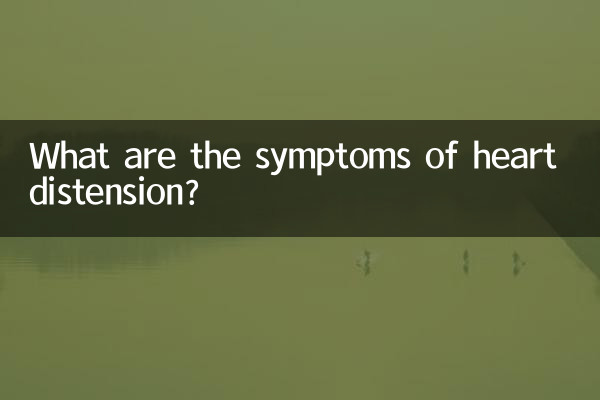What are the symptoms of heart disease?
Heart disease is one of the leading causes of death worldwide, and understanding its symptoms is crucial for early detection and treatment. This article will introduce in detail the common symptoms of heart disease, and combine it with the hot topics and hot content on the Internet in the past 10 days to help readers better identify and deal with heart problems.
1. Common symptoms of heart disease

Symptoms of heart disease vary by type and severity, but here are some of the most common manifestations:
| Symptoms | Description |
|---|---|
| chest pain or discomfort | It usually presents as pressure, tightness, or pain that may radiate to the arms, neck, or back. |
| difficulty breathing | Shortness of breath during activity or at rest may be related to heart failure or pulmonary embolism. |
| Palpitations | An irregular, fast or slow heartbeat may be accompanied by dizziness or fainting. |
| fatigue | Unexplained, persistent fatigue, especially in women, may be an early sign of heart disease. |
| dizziness or fainting | Reduced blood flow to the brain due to insufficient heart pumping may cause dizziness or sudden fainting. |
| Lower limb edema | Swelling in the ankles or legs may be a sign of heart failure. |
2. Recent hot topics and discussions related to heart disease
In the past 10 days, discussions about heart disease on the Internet have mainly focused on the following aspects:
| hot topics | Content summary |
|---|---|
| Heart disease rates rising among young people | Data shows that people under the age of 30 have increased cases of heart disease due to bad lifestyle habits (such as staying up late and eating high-fat meals). |
| Application of artificial intelligence in heart disease diagnosis | AI technology has significantly improved the detection rate of early heart disease by analyzing electrocardiogram and imaging data. |
| Heart complications after COVID-19 | Studies have found that some recovered patients develop myocarditis or arrhythmias and require long-term monitoring of their heart health. |
| Differences in heart disease symptoms in women | Women are more likely to experience atypical symptoms (such as nausea, back pain), leading to a higher rate of misdiagnosis. |
3. How to deal with symptoms of heart disease
If you or someone close to you has the above symptoms, it is recommended to take the following measures:
| action steps | Specific instructions |
|---|---|
| seek medical attention immediately | If chest pain lasts for more than 15 minutes or is accompanied by other serious symptoms, you should call the emergency hotline immediately. |
| record symptoms | Record the time, frequency and triggers of symptoms in detail to help doctors diagnose quickly. |
| adjust lifestyle | Quitting smoking, limiting alcohol, eating a balanced diet and exercising regularly can significantly reduce the risk of heart disease. |
| Regular physical examination | People over 40 years old should have blood pressure, blood lipids and electrocardiogram checked every year. |
4. Preventive Measures for Heart Disease
Prevention is better than cure, and here are the key ways to reduce your risk of heart disease:
| Precautions | Effect |
|---|---|
| control blood pressure | Keeping blood pressure below 120/80 mmHg can reduce the risk of heart disease by 50%. |
| manage cholesterol | Low-density lipoprotein (LDL) should be less than 100 mg/dL, and high-density lipoprotein (HDL) should be greater than 40 mg/dL. |
| maintain a healthy weight | A BMI in the range of 18.5-24.9 can reduce the burden on the heart. |
| Reduce stress and relax | Chronic stress can elevate cortisol levels, and 30 minutes of daily meditation or exercise can significantly improve this. |
Conclusion
The symptoms of heart disease are diverse and potentially life-threatening, and prompt recognition and action are crucial. Based on recent hot topics, it can be seen that the public's attention to heart health continues to rise, especially the risk management of young people and special groups (such as those who have recovered from COVID-19). Through scientific prevention and regular examinations, we can effectively protect heart health.
Please note: This article is for reference only. Specific diagnosis and treatment must be based on medical advice. In case of emergency, please contact a medical facility immediately.

check the details

check the details